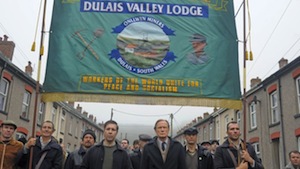Pride

 While it was announced a few hours earlier that Matthew Warchus is set to take over from Kevin Spacey at the Old Vic, the director was in Cannes’ Directors Fortnight selection with Pride. The movie focuses on a group of gay activists during the miners’ strike in the 1980s who decided to create a support group, the LGSM (Lesbians and Gays Support the Miners), and found their help unwelcome.
While it was announced a few hours earlier that Matthew Warchus is set to take over from Kevin Spacey at the Old Vic, the director was in Cannes’ Directors Fortnight selection with Pride. The movie focuses on a group of gay activists during the miners’ strike in the 1980s who decided to create a support group, the LGSM (Lesbians and Gays Support the Miners), and found their help unwelcome.
Pride is a film about revolution, mainly of minds rather than mines. It illustrates the strength in numbers, as opposed to fighting personal battles alone; prejudices are hard to overcome, but most of the time it’s worth the effort. Warchus’ feature is an important one because even if the plot is set 30 years ago, it still is current. And it’s important that cinema remains a vector of history and the progression of ideas.
Though the movie’s producer and director didn’t want it to be too sentimental, it is – as a subject like this one must be. But above all else, it is true, because it both examines an historic strike and focuses on problems within the families concerned. Too few movies give credence to both sides of a situation, but this one does. The cast help a lot, their interpretations of real and fictional characters being so natural and respectful.
Pride is one of many films about the miners’ strike, but it succeeds at being new, refreshing and pertinent. The director spent a lot of time and energy researching details about the event, and his movie reflects this commitment.
In the 80s, nobody could have predicted that 30 years later a rainbow flag would flutter over the Cabinet Office, and movies like Pride are to be thanked for that. Here, in Cannes, the audience gave a standing ovation to prove it.
Liloïe Cazorla
Pride is released nationwide on 12th September 2014.
Read more reviews from Cannes Film Festival 2014 here.
For further information about the festival, visit the official website here.
Watch an extract from Pride here:



















Facebook
Twitter
Instagram
YouTube
RSS